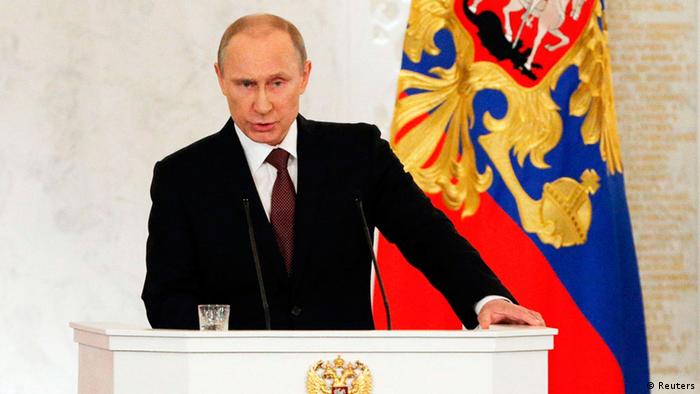Welcome
....to JusticeGhana Group

JusticeGhana is a Non-Governmental [and-not-for- profit] Organization (NGO) with a strong belief in Justice, Security and Progress....” More Details
Putin defends Russia's actions in Crimea, saying it 'wants to be with Russia'
- Details
- Parent Category: Africa and The World
- Category: Current Issues
- Created on Tuesday, 18 March 2014 00:00
- Hits: 3714
 Putin defends Russia's actions in Crimea, saying it 'wants to be with Russia'
Putin defends Russia's actions in Crimea, saying it 'wants to be with Russia'
President Putin has defended his country's inclusion of Crimea into the Russian Federation, citing a common history. He also hit back at Western critics for what he said was their contradictory use of international laws.
During an address to lawmakers in Moscow on Tuesday, Russian President Vladimir Putin spoke about Crimeans' decision to join the Russian Federation. The speech hit on a number of topics, from the injustice of Crimea's transfer to Ukraine in 1954, to the peninsula's legal and just declaration of independence, to Western leaders' hypocrisy in their portrayal of how recent events transpired.
"The referendum [in Crimea on March 16] was open and honest," President Putin said.
"[The people of Crimea clearly and convincingly expressed their will [that] they want to be with Russia," he said, adding that recent polls showed that over 90 percent of Russians supported annexation of the Black Sea peninsula.
The official count released by elections officials on Monday showed that 96.77 percent of the ballots cast in Crimea over the weekend voted to secede from Ukraine and join the Russian Federation. Ahead of the secession referendum, Western leaders dismissed the vote as illegal and illegitimate. They also accused Russia of orchestrating the political events after its leadership repeatedly refused to recognize the interim government in Kyiv, which favors closer ties with the EU.
Unmoved by such criticism, minutes after the speech, Putin signed a treaty to make the Crimean Republic part of the Russian Federation. This has to be endorsed by Russia's constitutional court as well as Russian and Crimean lawmakers before it can take effect.
Crimea 'an inalienable part of Russia'
The Russian leader focused much of his speech on Russian history as part of his justification for supporting the outcome of the Crimean referendum.
"Russia has become of the biggest divided nations in the world," Putin said, referring the separation of large Russian territories as the Soviet Union broke apart during the 1990s.
Putin argued that Crimea's transfer to Ukraine in 1954 came at a time when nobody imagined that Ukraine would one day separate from Russia, especially considering the long, shared history of all three regions. It was also decided behind closed doors.
"Russia felt it [had been] robbed," the Russian president said.
Crimea followed international precedents
Putin also hit back at criticism of Crimea's move for independence from Ukraine, citing US and United Nations documents from the last five years relating to Kosovo's secession in 2008.
"Common international law does not stipulate any ban on declaring independence, it is all very clear," the Russian president said, citing a US memorandum from April 17, 2009 to the International Criminal Court: "declaration of independence can violate internal law but that does not mean that there is a violation of international law."
The Russian leader also denied that his country had intervened in Ukraine, insisting that the Russian troops in Crimea had not been deployed to the region, but were already stationed there. He also said their numbers did not exceed the 25,000 under an international accord.
"I can't remember one act of [military] intervention [in history that occurred] without one single shot," Putin said.
Ties with Ukraine 'crucial'
He accused Western leaders - who slapped sanctions on Russians on Tuesday in response to the situation in Crimea - of acting irresponsibly by supporting the current government in Kyiv, which he characterized as being led by "anti-semites, russo-phobes, nationalists and neo-nazis."
In contrast to Ukraine, he and his government were committed to supporting the various ethnic groups in Crimea, where the minority Muslim Tartar population was one repressed by the Soviet Union.
That group, which makes up less than 15 percent of the peninsula's inhabitants, has expressed fears about switching allegiance back to Moscow. However, Putin vowed during his speech to work toward rehabilitating their community and protecting their rights.
"We are deeply concerned with what's happening in Ukraine and our concern is understandable. We're not just neighbors, we are one nation. Kyiv is the mother of Russian cities.. .Russia is our common root, our common fundament. We won't be able to live without each other," he said.
kms/pfd (AP, Reuters)
Source: Deutsche Welle





